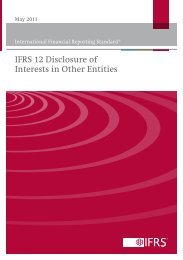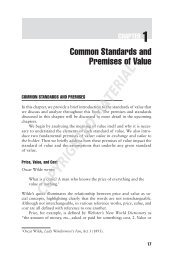ISSUE 5 2008 - Sweet & Maxwell
ISSUE 5 2008 - Sweet & Maxwell
ISSUE 5 2008 - Sweet & Maxwell
You also want an ePaper? Increase the reach of your titles
YUMPU automatically turns print PDFs into web optimized ePapers that Google loves.
Crim. L.R. Sentencing 399<br />
requirement, for two years. The appellant had numerous previous convictions for<br />
burglary and was liable to a minimum sentence of three years’ imprisonment under<br />
the Powers of Criminal Courts (Sentencing) Act 2000 s.111(2), unless the court<br />
was of the opinion that there were particular circumstances which would make it<br />
unjust to impose such a sentence in the circumstances. The sentencing judge found<br />
such circumstances to exist. The appellant left the drug rehabilitation centre which<br />
he was required to attend without permission and was eventually brought back<br />
before another judge of the Crown Court for a breach of the requirement of the<br />
order. The second judge stated that the appellant had thrown away the opportunity<br />
that he had been given. He revoked the suspended sentence order and sentenced<br />
the appellant to three and a half years’ imprisonment.<br />
Held, it was submitted that in revoking the suspended sentence order and<br />
resentencing the appellant, the judge erred in law. The Criminal Justice Act 2003<br />
Sch.12 para.8 dealt with the powers of the court where there had been a breach of<br />
a community requirement attached to a suspended sentence order. It empowered<br />
the court to deal with an offender by ordering the suspended sentence to take effect<br />
with the original term unaltered or with a lesser term. Alternatively the court might<br />
amend the order by imposing more onerous community requirements, extending<br />
the supervision period or extending the operational period. Those provisions were<br />
to be compared with the powers of the court when dealing with a breach of<br />
a requirement of a community order as opposed to a community requirement<br />
attached to a suspended sentence order. This was governed by para.10 of Sch.8 to<br />
the 2003 Act, which empowered the court to deal with the offender ‘‘in any way in<br />
which he could have been dealt with for the offence by the court which made the<br />
order if the order had not been made’’.<br />
The result was that the wholly deserved sentence passed by the second judge<br />
was not a lawful sentence. The court would quash the sentence of three and a<br />
half years’ imprisonment and activate the original suspended sentence. The lesson<br />
ofthecasewasthatwhereajudgefeltabletotakeamercifulcourseandnot<br />
impose an immediate and substantial custodial sentence, which but for exceptional<br />
circumstances would have been merited, it is better to pass a community order,<br />
spelling out to the offender the consequences of a breach, rather than a suspended<br />
sentence artificially low in its terms, limited to a maximum period of 12 months,<br />
so that if there was a breach, the court’s powers would not be limited as they had<br />
been in the case before the court.<br />
E. Blackman for the appellant.<br />
S. Vallaile for the Crown.<br />
Commentary. This decision provides a useful illustration of the point made at the<br />
end of the judgment. A suspended sentence order with a community requirement<br />
(which is always obligatory) sounds more onerous than a simple community order, but<br />
its bark may often be worse than its bite. Breach of a suspended sentence order may<br />
be more likely to lead to the imposition of a custodial sentence, in view of Sch.12<br />
para.8(3), which requires the court to activate the sentence in full unless it would be<br />
unjust to do so, but the custodial sentence can never exceed the term of the sentence<br />
which was originally suspended. Breach of a community order does not carry any<br />
statutory presumption that a custodial sentence will follow, but if the court decides<br />
to impose a custodial sentence following a breach of a community order, it is not<br />
© SWEET &MAXWELL






